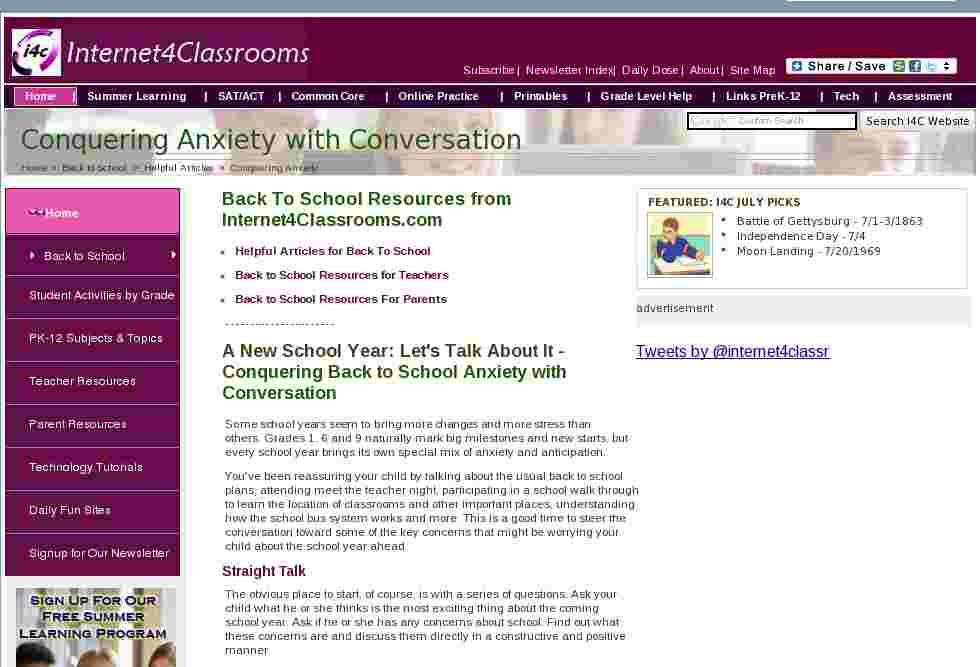Back To School Resources from Internet4Classrooms.com
- Helpful Articles for Back To School
- Back to School Resources for Teachers
- Back to School Resources For Parents
----------------------
A New School Year: Let's Talk About It - Conquering Back to School Anxiety with Conversation
Some school years seem to bring more changes and more stress than others. Grades 1, 6 and 9 naturally mark big milestones and new starts, but every school year brings its own special mix of anxiety and anticipation.
You've been reassuring your child by talking about the usual back to school plans, attending meet the teacher night, participating in a school walk through to learn the location of classrooms and other important places, understanding how the school bus system works and more. This is a good time to steer the conversation toward some of the key concerns that might be worrying your child about the school year ahead.
Straight Talk
The obvious place to start, of course, is with a series of questions. Ask your child what he or she thinks is the most exciting thing about the coming school year. Ask if he or she has any concerns about school. Find out what these concerns are and discuss them directly in a constructive and positive manner.
You and your child's older siblings or friends can provide reassuring stories and examples that show the school experience in the best possible light. Sometimes the unknown times tables or physical science studies, for example can seem mysterious and even threatening, but once a student knows what these things are, they find they're actually very interesting and really no big deal.
The Joy of Learning
As you talk about the first day of school, focus on the good things that a new year brings. A brand new school year is a chance for a fresh start; it's an exciting time full of unlimited possibility. Help your child not to focus on negative ideas, like the end of the summer, the return to the confining schedule of the classroom and other not so happy thoughts.
Point out that a new school year always brings countless opportunities to learn new things, to make new friends and to encounter new situations that can be found only in school.
Parents should encourage youngsters to be excited about the things they'll be learning in the months ahead. Most students will embrace new learning; they'll be excited to delve deeper into the things that interest them.
Keep the positive attitude front and center as you discuss things that are outside of a student's control. A best friend may be placed in a different class this year. Help your student see that the situation isn't a tragedy. She or he may not have a best friend in class, the one who's been there for the past two or three years, but this is the start of a chance to make a new friend or work in the classroom in a new way. Encourage your child to go into the situation with an open mind and a positive attitude.
Mistakes as Opportunities
Students, particularly middle school students, are anxious about making mistakes. They want to please their teachers and others. Let your child know that it's ok to make mistakes. Point out to middle schoolers, especially, that there's no such thing as perfection. Encourage them to do the best they can and move on to the next project.
Keep in mind that middle school students as well as students at other grade levels can be very hard on themselves about mistakes. You can encourage them to avoid the problems that lead to mistakes by helping them think about planning their work in advance, avoiding procrastination and starting projects well before the due date.
High Stakes Testing: These days, nearly every student is anxious about the high stakes tests that must be passed to move ahead in school. Talk to your child about the benchmark tests that he or she will be taking prior to the actual high stakes testing. Let him or her know that these tests are practice opportunities; each benchmark test is a chance to learn about the rhythm of test taking, as well as an opportunity to showcase the understanding of a particular subject. Talk with your child about ways to build confidence in his or her test taking ability. Confidence and keeping up with assigned studies will help students face test day with a positive attitude and the expectation of a good outcome.
Lifelong Learning
Remember that educators want every child to become a lifelong learner. To reach this goal, students must find the joy in education. As a parent, you can help your young learner move smoothly along this very important path.
-- Kathie Felix
Kathie Felix writes about education for a variety of national news media outlets.

Search Internet4Classrooms







